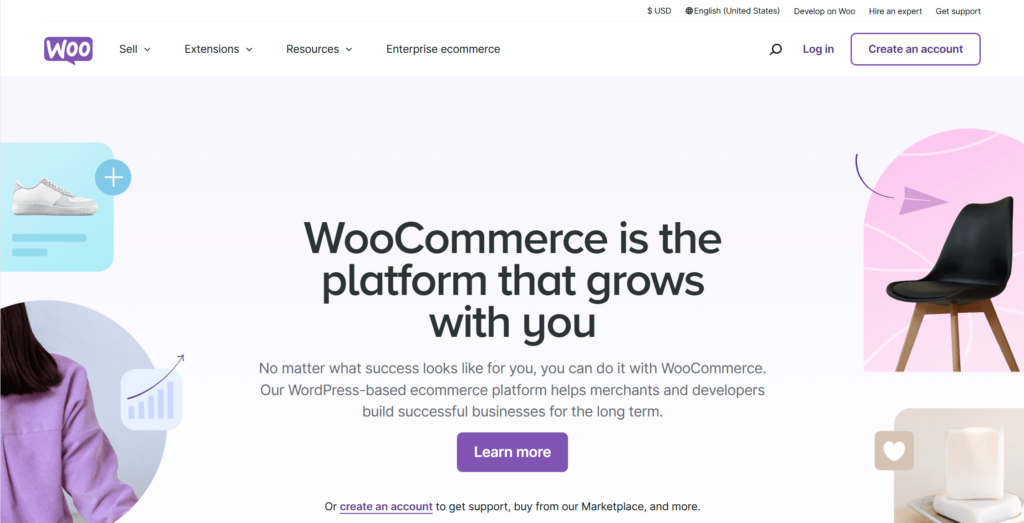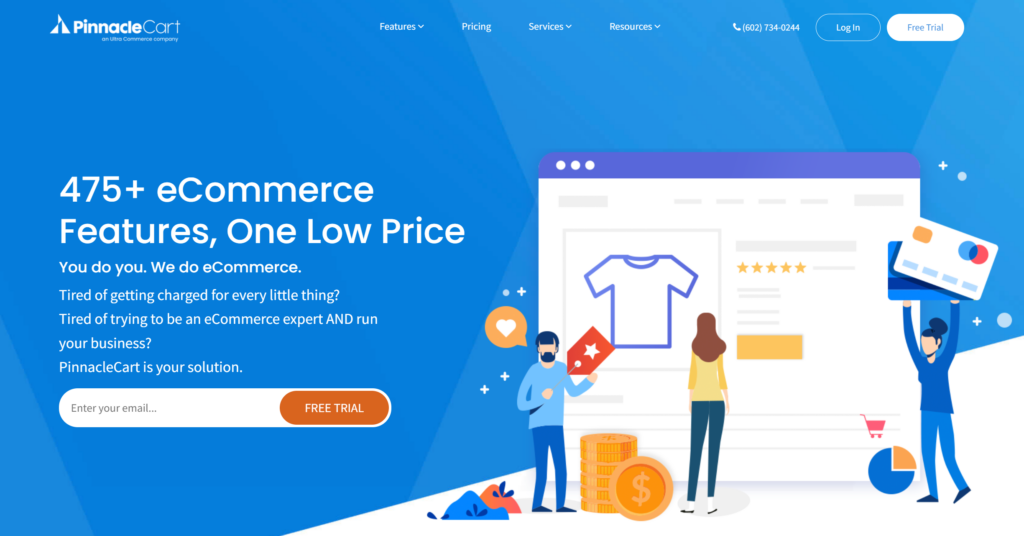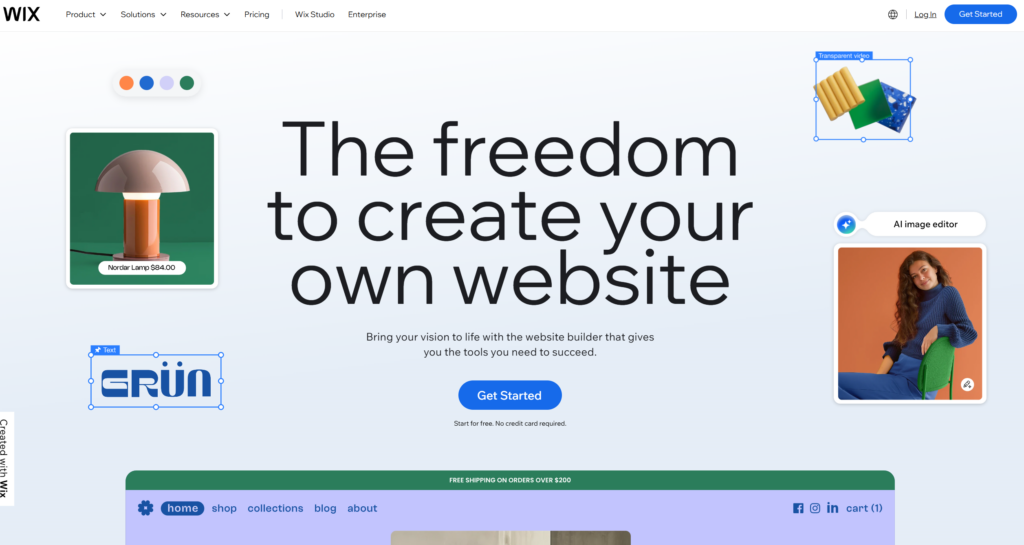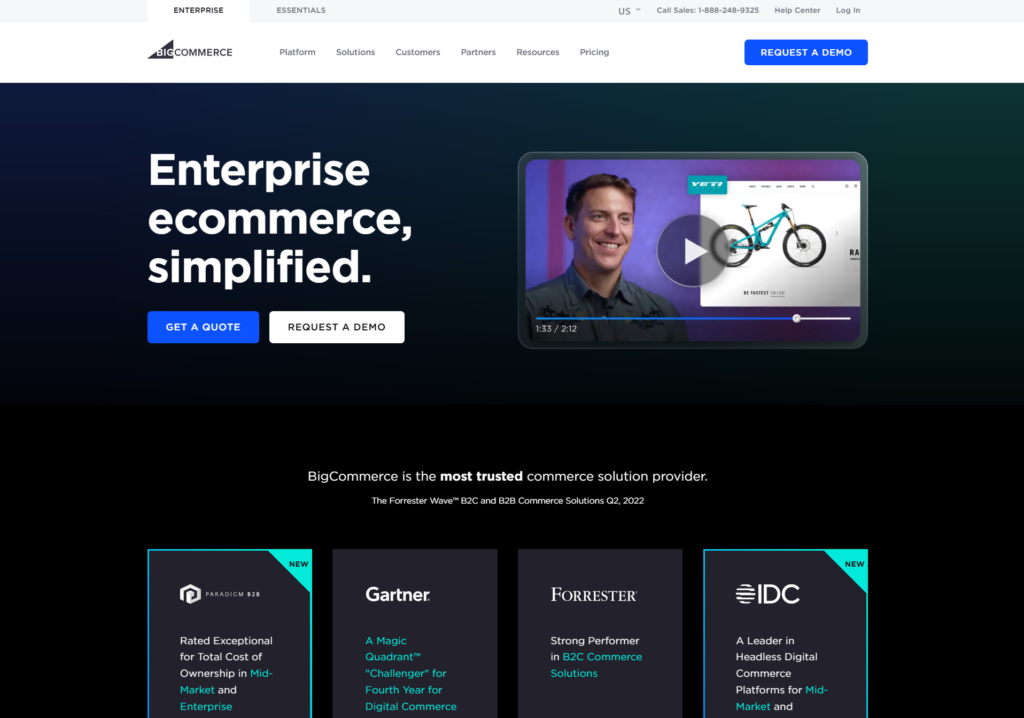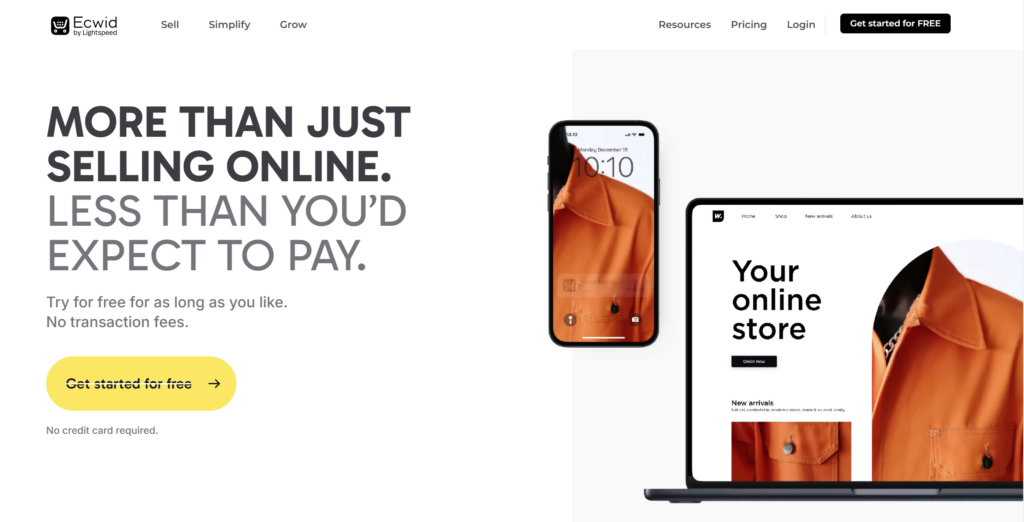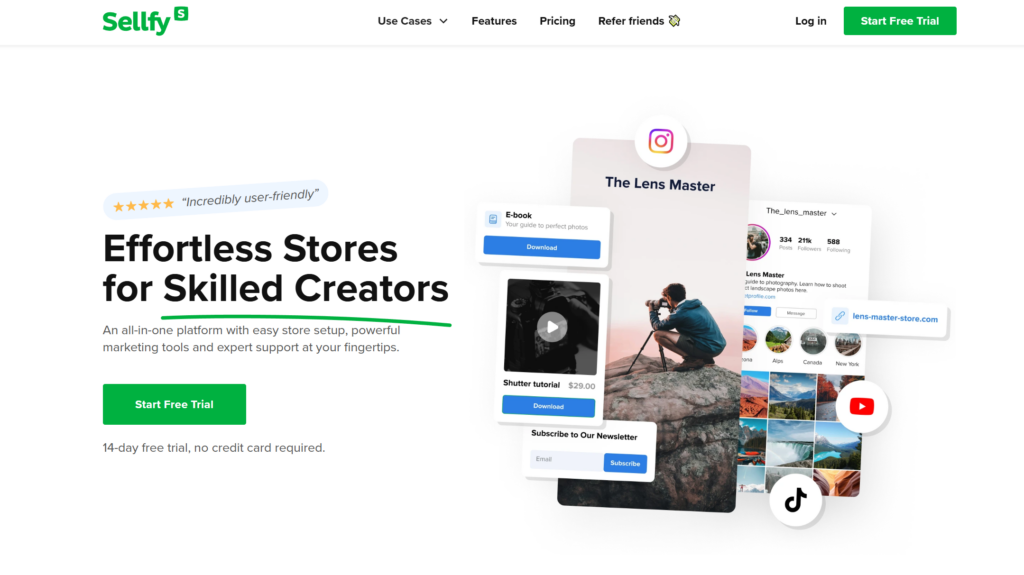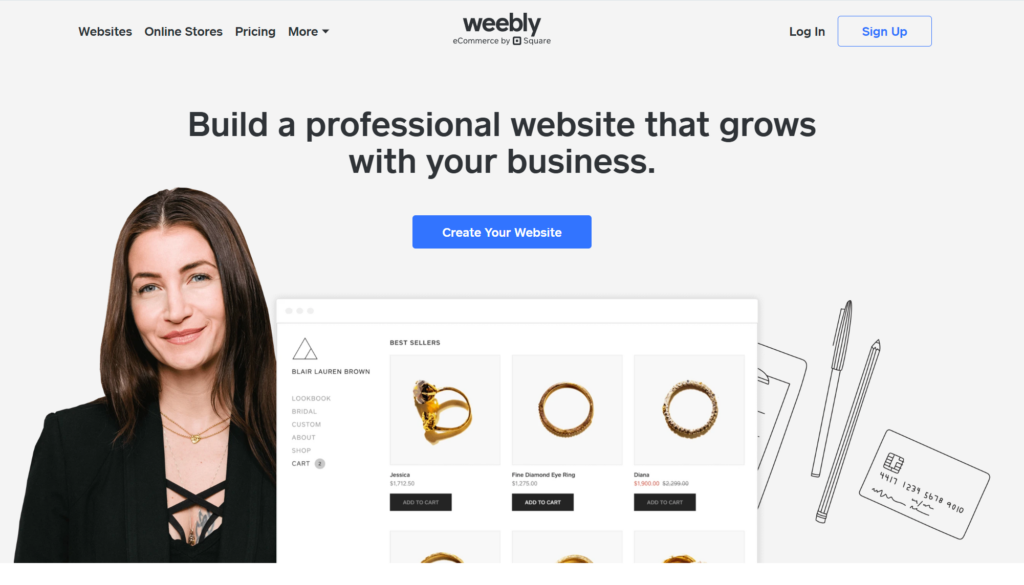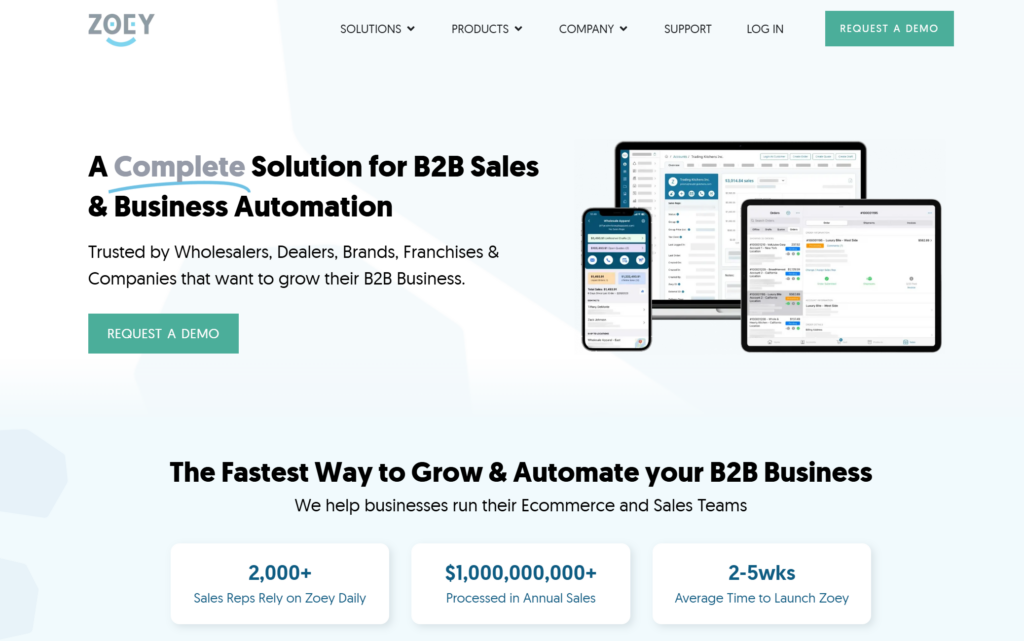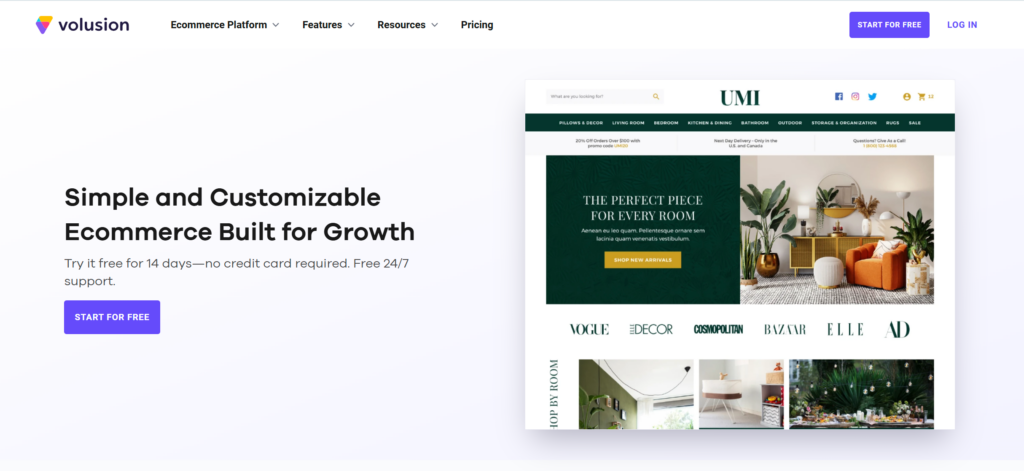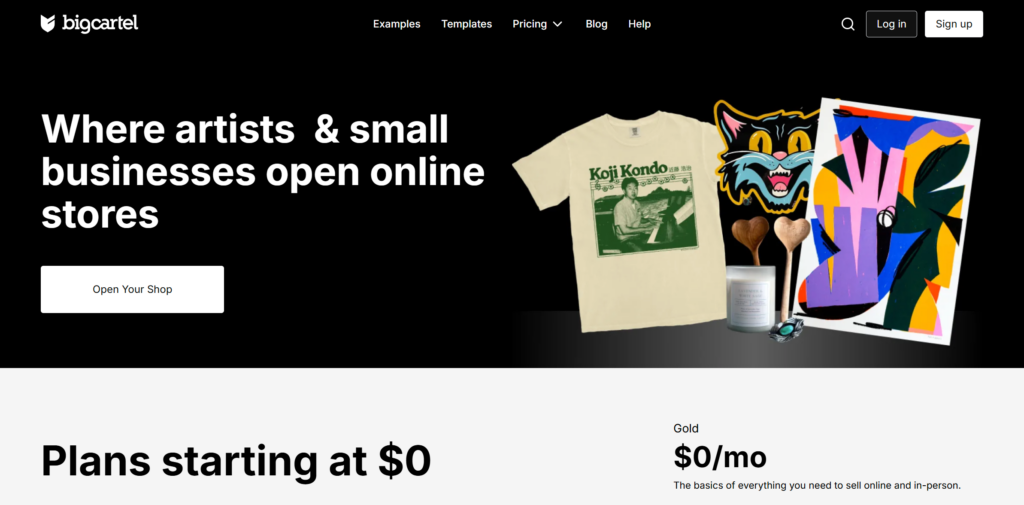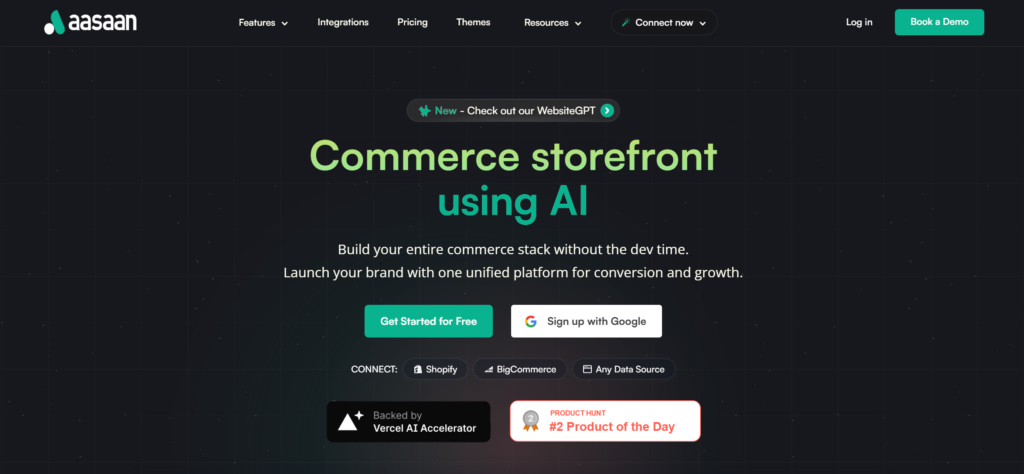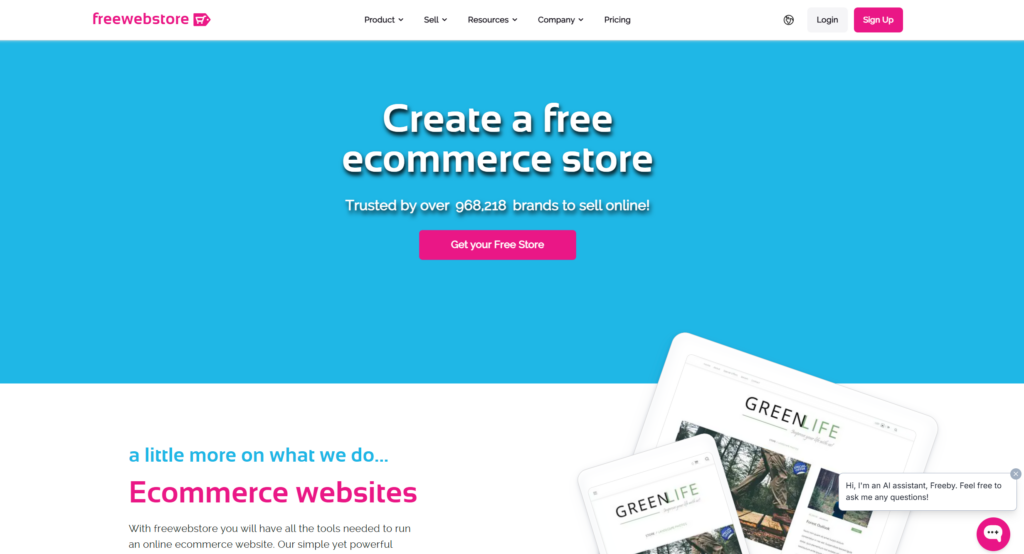Shopify has established such a stronghold in the e-commerce platform market that many business owners aren’t even aware of the available alternatives. However, Shopify has its drawbacks: larger companies often find its tools insufficient for scaling and advanced marketing, while small businesses are deterred by its high subscription costs. After dedicating 260 hours to researching and refining this information, we’ve compiled a list to help you find the best Shopify alternatives tailored to businesses of all sizes and needs.
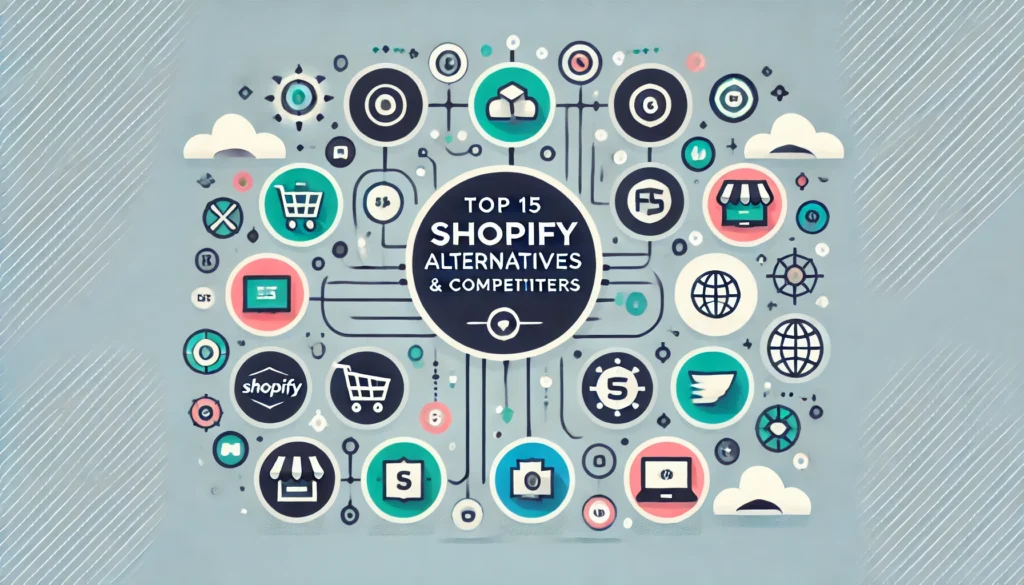
What is Shopify?
The platform offers a website builder that requires no coding skills. Users can build pages using hundreds of templates designed for various products—from plush toys to heavy machinery. But Shopify’s features go far beyond website creation. The platform also provides access to a payment system supporting international transactions with automatic currency conversion.
With a single click, Shopify integrates with major shipping services to automatically calculate delivery costs and timelines. Plus, it supports direct selling via social media, including Facebook and Instagram.
But the subscription fee isn’t the only charge; Shopify also takes a commission on each sale, around 2% depending on the plan, and an additional 1-2% for transactions processed through third-party payment gateways.
How to Choose the Best Shopify Alternative
Selling hand-knit hats via Instagram and managing wholesale orders for a business require vastly different platform features. Since subscription costs are tied directly to the available tools, it’s essential to identify key parameters before selecting a platform:
- List the necessary features. This might include multi-channel sales, marketing and promotional tools, dropshipping, currency conversion, and integration with other platforms and social media.
- Choose preferred shipping providers. Logistics are foundational to any online store, so make sure the platform’s shipping partners operate in your target region or country.
- Ease of use. If your team lacks in-house developers or designers, look for a platform with a simple template-based website builder.
- Customer support. Many overlook the importance of support when choosing a platform, but experience shows that every business will eventually need it. If tickets take three days to resolve, it could mean revenue loss for your store.
- Pricing and fees. Unfortunately, not all platforms are transparent with pricing. Low subscription costs often mask transaction fees of 2-3%. For high-volume stores, a pricier plan without transaction fees could be more cost-effective.
Top-15 Shopify Alternatives for 2024
| Rank | Name | Description | Website |
|---|---|---|---|
| 1 | WooCommerce | A powerful and flexible tool to add e-commerce functionality to WordPress sites. | woocommerce.com |
| 2 | Magento | A feature-rich platform that requires programming skills for customization. | business.adobe.com |
| 3 | PinnacleCart | A straightforward service focused on advertising and product promotion. | pinnaclecart.com |
| 4 | Shift4Shop | An advanced website builder with extensive creative possibilities, though not the easiest to learn. | shift4shop.com |
| 5 | Wix | A builder offering 800 templates for nearly every use case but with limited e-commerce features. | wix.com |
| 6 | BigCommerce | A platform ideal for corporations with limitless scalability. | bigcommerce.com |
| 7 | Squarespace | A platform for social media selling with an advanced AI assistant. | squarespace.com |
| 8 | Ecwid | A plugin that instantly turns any website into an online store. | ecwid.com |
| 9 | Sellfy | A platform for selling digital content and print-on-demand products. | sellfy.com |
| 10 | Weebly | The most affordable Shopify alternative with a flexible builder and promotional tools package. | weebly.com |
| 11 | Zoey | A service for B2B, wholesale, and business management. | zoey.com |
| 12 | Volusion | A simple website builder with strong technical support and fast customer service. | volusion.com |
| 13 | Big Cartel | The easiest service for quickly launching an online store. | bigcartel.com |
| 14 | Aasaan | A platform with an advanced AI assistant. | aasaan.app |
| 15 | Freewebstore | A platform for beginner sellers with numerous free features. | freewebstore.com |
1. WooCommerce
A flexible, open-source solution for adding e-commerce functionality to WordPress-hosted sites.
WooCommerce functions as a plugin for WordPress that can be installed with just one click. Once set up, users gain access to over 140 payment gateways, including Amazon Pay, Apple Pay, Google Pay, and PayPal.
Like Shopify, WooCommerce provides:
- SEO and marketing tools,
- integration with shipping services, and
- the option to connect with platforms like Facebook, Amazon, and other social media and marketplaces.
Since WooCommerce is an open-source plugin, installation and basic use are nominally free. However, it monetizes through a transaction fee of 2.9% + 30 cents per purchase.
WooCommerce also offers various paid features and settings. Although each paid option is relatively inexpensive, these expenses can quickly add up, potentially costing thousands before the store even launches. Additionally, WooCommerce only works on WordPress sites, with WordPress subscriptions starting at $30 per month.
| Feature | Additional Details |
|---|---|
| Launch Year | 2011 |
| Parent Company | Automattic, the company behind WordPress.com |
| Popular Extensions | WooCommerce Subscriptions, WooCommerce Bookings, Product Add-Ons, Stripe Payment Gateway, ShipStation Integration |
| Global Reach | Used in over 200 countries, available in multiple languages |
| Security Features | Regular security updates, compatible with various WordPress security plugins, PCI-compliant payments |
| Mobile Compatibility | Mobile-responsive store designs, WooCommerce Mobile App for iOS and Android for managing orders and inventory on the go |
| Developer Community | Strong developer community with extensive documentation and forums, making customizations easier |
| Integration with Analytics | Supports Google Analytics Enhanced Ecommerce for advanced data tracking |
| User Support | Offers a support ticket system, WooCommerce Docs, user forums, and premium support options through extensions |
| Inventory Management | Built-in inventory management with stock alerts, backorder options, and SKU tracking |
| Scalability | Suitable for small businesses and scalable for large enterprises with dedicated hosting and advanced configurations |
| Alternative Hosting Options | Compatible with WooCommerce-hosted and third-party hosting services beyond WordPress.com (e.g., WP Engine, SiteGround) |
Website: https://woocommerce.com
- Pricing: Nominally free, with a transaction fee of 2.9% + 30 cents per transaction.
Pros:
Cons:
2. Magento
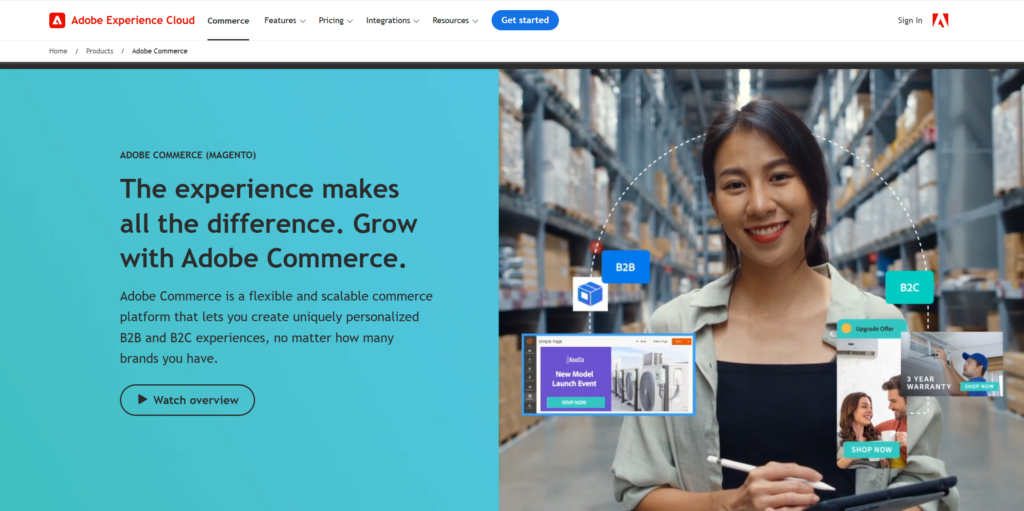
A robust and feature-packed e-commerce platform by Adobe, suited for those who are comfortable working with code.
Magento’s greatest strength lies in its vast array of features and options. It includes:
- B2B and B2C functionalities,
- tools for ad optimization, SEO, and customer behavior tracking,
- accounting features, currency conversion, reporting tools, and even
- team project collaboration options.
For further customization, there’s a marketplace of both free and paid extensions. An AI assistant also helps users navigate and utilize many of these features.
Magento allows businesses to meet all their needs in one service, eliminating the need for workarounds. However, this comes at the cost of complexity. Magento lacks a visual website builder, so creating a page requires coding skills. Large companies may need to hire specialists to handle the platform, making Magento impractical for beginners.
| Feature | Additional Details |
|---|---|
| Launch Year | 2008 |
| Parent Company | Adobe Inc. |
| Types of Magento Versions | Magento Open Source (free), Adobe Commerce (paid) |
| Supported Businesses | Small to enterprise-level businesses, with B2B and B2C options |
| Global Reach | Available in over 50 languages and supports multiple currencies |
| Security Features | Includes SSL, two-factor authentication, CAPTCHA, and PCI compliance |
| Developer Community | Strong community and resources available, including extensive forums and Magento DevDocs |
| Integration with Adobe Products | Direct integrations with Adobe products like Analytics, Target, and Experience Manager |
| Mobile Optimization | Mobile-friendly design with Progressive Web App (PWA) Studio for enhanced mobile experience |
| AI & Machine Learning | Built-in AI tools like product recommendations, live search, and personalization options |
| Scalability | Highly scalable with support for multiple stores, languages, and sites |
| Hosting Requirements | Self-hosted; requires knowledge of server management, or compatible with hosting providers like AWS, Nexcess, and SiteGround |
| Performance Tools | Performance optimization features, including caching, indexing, and Content Delivery Network (CDN) support |
| Popular Extensions | One Step Checkout, Amasty Layered Navigation, Magento Shipping, Mirasvit Search Suite, and more |
Website: https://business.adobe.com/products/magento/magento-commerce.html
- Pricing: Free 1-month trial, then $15 per month.
Pros:
Cons:
3. PinnacleCart
From a platform suited for corporations, we now move to one of the simplest tools for online selling.
PinnacleCart allows users to quickly create a website using a simple builder, integrate a payment system, organize product listings, set prices, and start selling. A training program introduces users to platform features upon their first login.
Designed by marketers, PinnacleCart includes essential promotion tools, including an SEO assistant that facilitates meta descriptions and product link optimization. For sales, it integrates with Instagram and syncs with the store’s website.
Since PinnacleCart’s data is cloud-based, users can manage their business from any platform, with apps available for Windows, macOS, and Android. Data can be transferred easily from other sales platforms, including Shopify.
| Feature | Additional Details |
|---|---|
| Launch Year | 2003 |
| Target Audience | Small to medium-sized businesses, ideal for beginners and non-technical users |
| Parent Company | Pinnacle Cart, Inc. |
| Hosting | Fully cloud-hosted on PinnacleCart’s servers |
| Supported Payment Gateways | Over 30 payment options, including PayPal, Square, Stripe, and Authorize.net |
| Supported Sales Channels | Direct integration with Google Shopping, Amazon, eBay, and Facebook |
| Inventory Management | Basic inventory tracking with alerts for low stock levels and SKU management |
| Security Features | PCI-compliant, SSL certificates, and fraud detection tools |
| Data Migration | Migration support for Shopify, WooCommerce, BigCommerce, and other platforms |
| Customization Options | Limited customization via a theme editor; advanced customization requires coding skills |
| Customer Support | 24/7 customer support via chat, email, and phone |
| SEO Features | SEO-focused tools including customizable URLs, meta tags, and a sitemap generator |
| Mobile Optimization | Responsive templates and mobile app available for order management on Windows, macOS, and Android |
| Performance Tools | Basic performance optimization, with built-in caching for faster load times |
| Trial & Refund Policy | 14-day free trial and a 30-day money-back guarantee on subscriptions |
Website: https://www.pinnaclecart.com
- Pricing: Minimum subscription fee of $50 per month, with a storage limit of 1 GB—likely insufficient for a larger store. The unlimited storage plan is $99 per month, and no transaction fees are charged.
Pros:
Cons:
4. Shift4Shop
A simple online marketing and sales tool designed for small businesses.
Shift4Shop provides a variety of tools for website design customization. It’s easy to create an eye-catching page that helps a store stand out, although the interface is not the simplest, and professional design assistance may be necessary.
Otherwise, the functionality is fairly standard, including:
- marketing and SEO tools,
- support for dropshipping,
- SSL security certificates, and
- around 100 payment gateways.
Unlike Shopify, Shift4Shop does not charge transaction fees, even for credit card payments, although there are shipping fees.
| Feature | Additional Details |
|---|---|
| Launch Year | 1997 (originally known as 3dcart, rebranded to Shift4Shop in 2020) |
| Parent Company | Shift4 Payments |
| Supported Business Types | Small to medium-sized businesses, with tools also supporting B2B sales |
| Global Reach | Available globally, with support for multiple currencies and languages |
| Security Features | Includes SSL certificate, PCI compliance, and advanced fraud detection |
| Developer Community | Provides API access for developers, though the community is smaller compared to Shopify or WooCommerce |
| Mobile Optimization | Mobile-responsive themes and free mobile app for order management |
| Product Management | Unlimited product listings, customizable product attributes, and SKU tracking |
| Customer Support | 24/7 customer support via phone, live chat, and email, plus extensive knowledge base |
| SEO Features | Built-in SEO tools including meta tags, URL customization, a sitemap generator, and 301 redirects |
| Marketing Tools | Integrated email marketing, abandoned cart saver, affiliate program support, and discount management |
| Dropshipping Support | Direct integration with major dropshipping suppliers like AliExpress, Printful, and Doba |
| Performance Optimization | Built-in caching, CDN support, and page speed optimization |
| Alternative Pricing Option | Free end-to-end eCommerce package for U.S. merchants processing payments through Shift4 |
| Trial Period | 15-day free trial with access to all premium features |
Website: https://www.shift4shop.com
- Pricing: $39 per month for the standard plan (single user and PayPal-only payments); $229 for support for multiple employee accounts and access to all payment gateways.
Pros:
Cons:
5. Wix
The most beginner-friendly, affordable Shopify alternative.
Primarily, Wix is a website builder. Users can create a page in minutes by dragging and dropping pre-designed blocks. There are 800 templates available for various purposes, from landing pages to full online stores.
The builder also supports:
- embedded videos, audio, and images,
- with 40 gallery display options.
Wix’s app marketplace offers over 200 widgets, and while the builder itself is free, domain and hosting services cost $17 per month.
In terms of e-commerce tools, Wix is somewhat limited compared to competitors. The platform supports major online payment systems, abandoned cart recovery, and social media integration, but that’s where its business features end.
| Feature | Additional Details |
|---|---|
| Launch Year | 2006 |
| Parent Company | Wix.com Ltd. |
| Target Audience | Ideal for beginners, freelancers, and small to medium-sized businesses |
| Hosting | Fully hosted on Wix’s servers |
| Mobile Optimization | Mobile-responsive templates and a dedicated mobile editor for site customization on mobile devices |
| SEO Tools | Built-in SEO tools including customizable meta tags, alt text, URL slugs, and integration with Google Analytics |
| Supported Payment Gateways | Supports PayPal, Stripe, Square, and Wix Payments |
| App Market | Over 300 apps available, including tools for marketing, live chat, social media, and form builders |
| Customer Support | 24/7 support via phone and chat, along with a comprehensive knowledge base |
| Advanced E-commerce Tools | Limited compared to other platforms, but includes inventory tracking, automated tax calculation, and coupon creation |
| Video & Audio Support | Supports multiple media formats, with integration options for YouTube, SoundCloud, and more |
| Design Flexibility | Drag-and-drop builder with extensive customization options, though less flexible than full-code platforms like WordPress |
| Multilingual Support | Built-in tools for creating multilingual sites, ideal for businesses targeting international audiences |
| Performance Optimization | Includes basic caching, image optimization, and page speed improvements |
| Trial Period | 14-day money-back guarantee on premium plans |
Website: https://www.wix.com
- Pricing: $17 per month for website publication and a year of hosting. Accessing all business tools costs $36 per month.
Pros:
Cons:
6. BigCommerce
The main competitor to Shopify in enterprise e-commerce solutions.
BigCommerce offers a feature-rich site builder that doesn’t require coding skills. Although it may not be the easiest choice for beginners, it poses no issues for experienced professionals. For those needing advanced customization, the platform’s open code supports custom solutions in HTML/CSS.
This service provides users with unlimited storage, unlimited product listings, and the ability to create staff accounts. It also offers extensive SEO and advertising tools, plus integration with major social networks and marketplaces. BigCommerce seamlessly connects with Walmart, Google Shopping, Amazon, Facebook, Instagram, and eBay.
| Feature | Additional Details |
|---|---|
| Launch Year | 2009 |
| Parent Company | BigCommerce Holdings, Inc. |
| Target Audience | Mid-sized to large enterprises, with features also supporting B2B sales |
| Hosting | Fully hosted on BigCommerce’s cloud platform |
| Supported Payment Gateways | Over 65 options, including PayPal, Stripe, Square, Amazon Pay, Apple Pay, and more |
| Customization Options | Supports custom HTML, CSS, and JavaScript for advanced design flexibility |
| SEO & Marketing Tools | Advanced SEO tools, Google AMP support, customizable URLs, and integration with Google Analytics |
| Mobile Optimization | Mobile-responsive themes and Progressive Web App (PWA) capabilities for enhanced mobile experience |
| Inventory & Product Management | Unlimited products, SKU management, bulk editing, and real-time inventory tracking |
| Security Features | PCI Level 1 certified, SSL certificates, and fraud protection tools |
| Multichannel Selling | Direct integrations with Amazon, eBay, Walmart, Google Shopping, Facebook, and Instagram |
| Abandoned Cart Saver | Built-in abandoned cart recovery with customizable follow-up emails |
| Customer Support | 24/7 support via phone, live chat, and email, plus a knowledge base and BigCommerce University for tutorials |
| Scalability | Highly scalable for businesses looking to grow, with options for multi-store and international capabilities |
| Trial Period | 15-day free trial, allowing full access to all features |
Website: https://www.bigcommerce.com
- Pricing: BigCommerce is on the pricier side. A full business account costs $300 per month, and there’s an additional 2.5% + $0.30 transaction fee for each sale.
Pros:
Cons:
7. Squarespace
Squarespace focuses more on creativity and personal expression than on commerce.
Its intuitive site builder allows even beginners to create websites that look like those of top companies. Squarespace is especially popular among artists, designers, and musicians for displaying portfolios and is also a good choice for personal blogs or resumes.
While Squarespace isn’t primarily geared toward e-commerce, it still has a few noteworthy marketing and sales tools. It includes a powerful social media content creation tool, and an AI assistant helps with text generation for pages. Squarespace is available in Europe, Canada, and many other countries.
| Feature | Additional Details |
|---|---|
| Launch Year | 2004 |
| Parent Company | Squarespace, Inc. |
| Target Audience | Ideal for creatives, small businesses, freelancers, and individuals focused on visual presentation |
| Hosting | Fully hosted on Squarespace’s platform |
| Supported Payment Gateways | Supports Stripe, PayPal, and Apple Pay for e-commerce transactions |
| Customization Options | Drag-and-drop editor with customizable templates; limited advanced customization without code injection |
| SEO Tools | Built-in SEO tools, customizable meta tags, alt text, and integration with Google Analytics |
| Templates | Over 100 designer templates with options for portfolios, blogs, resumes, and small online stores |
| Mobile Optimization | Mobile-responsive templates and a mobile app for site editing and order management |
| E-commerce Limitations | Limited e-commerce features focused on small product catalogs, with no support for advanced inventory management |
| Social Media Integration | Tools for social sharing, social feed displays, and integration with Facebook, Twitter, Instagram, and Pinterest |
| Built-In Marketing Tools | Email marketing integration, basic CRM features, and analytics tools |
| Customer Support | 24/7 email support, live chat support during business hours, and a detailed help center |
| Membership & Subscription Features | Ability to offer subscription-based content and gated access for members |
| Trial Period | 14-day free trial available |
Website: https://www.squarespace.com
- Pricing: Five subscription tiers range from $16 to $52 per month. The basic tier includes just the builder, storage, and a domain. Higher tiers add sales and marketing tools.
Pros:
Cons:
8. Ecwid
A plugin similar to WooCommerce, which can add e-commerce functionality to existing websites.
Ecwid enables you to transform sites hosted on platforms like WordPress, Blogger, Tumblr, and Joomla into fully functional online stores with payments, promotion tools, and delivery options. With Ecwid, setup is fast and user-friendly, though it sacrifices some features for simplicity.
The platform includes customer behavior tracking, ad setup, and automated email marketing, but that’s where its promotional tools end. The limited feature set is delivered “as-is” with little customization available.
| Feature | Additional Details |
|---|---|
| Launch Year | 2009 |
| Parent Company | Ecwid, Inc. |
| Target Audience | Small businesses and entrepreneurs who want to add e-commerce to existing websites |
| Hosting | Works as a plugin on existing sites, hosted on Ecwid’s servers for store data |
| Supported Payment Gateways | Over 50 payment options including PayPal, Square, Stripe, and Authorize.net |
| Multichannel Selling | Sell on social platforms like Facebook, Instagram, TikTok, and integrate with Amazon and eBay |
| Mobile Optimization | Mobile-friendly design with a dedicated mobile app for store management |
| Customization Options | Limited customization through CSS; some layout options but no full drag-and-drop editor |
| SEO Tools | Basic SEO features with customizable URLs, meta tags, and alt text |
| Product Management | Inventory tracking, SKU management, and variant options for products |
| Security Features | SSL encryption, PCI compliance, and fraud detection tools |
| Customer Support | Email support for all plans, with chat and phone support available on higher-tier plans |
| E-commerce Features | Includes real-time shipping rates, tax calculations, abandoned cart saver, and automated marketing emails |
| Integration Options | Integrates with popular CMSs like WordPress, Wix, Joomla, Weebly, and custom websites |
| Trial Period | No time-limited trial, but a free plan available with basic features and up to 10 products |
Website: https://www.ecwid.com
- Pricing: Ecwid offers a free plan with a limit of 10 products, which doesn’t include promotional features. Paid tiers range from $25 to $90 per month, allowing for more products, ads, and support.
Pros:
Cons:
9. Sellfy
An ideal platform for creatives like artists, musicians, and photographers.
Sellfy is designed for selling digital products, services, and subscriptions. It supports subscriptions to blogs, newsletters, courses, as well as digital music, videos, and photos. There’s also a tool for selling customized merchandise like t-shirts and mugs.
Sellfy easily integrates with social media and existing websites, enabling first sales within minutes of signing up. However, it offers few marketing tools beyond affiliate marketing, email campaigns, and sales.
| Feature | Additional Details |
|---|---|
| Launch Year | 2011 |
| Parent Company | Sellfy |
| Target Audience | Creatives, freelancers, and small business owners, especially those selling digital products |
| Hosting | Fully hosted on Sellfy’s platform, with options to embed store widgets on other websites |
| Supported Payment Gateways | Supports PayPal and Stripe for seamless transactions |
| Customization Options | Limited site customization with basic design options; no full drag-and-drop builder |
| SEO Tools | Basic SEO tools including customizable URLs and meta descriptions |
| Digital Product Features | Includes automatic file delivery, unlimited bandwidth, and file hosting for digital products |
| Product Management | Supports physical products, digital products, print-on-demand, and subscription-based items |
| Multichannel Selling | Integrates with YouTube, Instagram, and Facebook for social media selling |
| Mobile Optimization | Mobile-friendly store layouts; no dedicated mobile app for management |
| Marketing Tools | Limited to affiliate marketing, discount codes, and email marketing features |
| Security Features | SSL encryption for secure transactions, plus automated VAT calculations for EU-based sales |
| Customer Support | Email support available for all plans; live chat support on higher-tier plans |
| Trial Period | 14-day free trial without feature limitations |
Website: https://sellfy.com
- Pricing: After a two-week free trial, pricing starts at $22 per month for stores with annual sales under $10,000. If sales exceed this limit, Sellfy applies a transaction fee.
Pros:
Cons:
10. Weebly
The most affordable Shopify alternative on the market.
Weebly’s site builder isn’t the simplest, so beginners may need time to get familiar with it, though using one of its hundreds of templates helps. Experienced designers and developers can use the open source code to modify any settings as needed.
Although its sales, payment, and marketing tools aren’t very flexible and have limited customizability, Weebly can be easily integrated into any website, supporting payment systems, social media links, and Google Analytics.
| Feature | Additional Details |
|---|---|
| Launch Year | 2006 |
| Parent Company | Square (acquired in 2018) |
| Target Audience | Small business owners, bloggers, and individuals looking for an affordable website or online store solution |
| Hosting | Fully hosted on Weebly’s platform |
| Supported Payment Gateways | Supports Square, PayPal, and Stripe for easy payment processing |
| Customization Options | Basic drag-and-drop editor with limited CSS and HTML customization for advanced users |
| SEO Tools | Built-in SEO tools, customizable meta tags, and integration with Google Analytics |
| Templates | Hundreds of templates available, covering various industries and purposes |
| Mobile Optimization | Mobile-responsive templates and a mobile app for managing site updates and orders |
| E-commerce Features | Inventory management, tax calculation, and basic product variations; limited features compared to larger platforms |
| App Center | Access to Weebly’s App Center with plugins for social media, email marketing, and analytics |
| Security Features | SSL encryption provided for secure browsing and transactions |
| Customer Support | Email and chat support, with phone support available for higher-tier plans |
| Multichannel Selling | Limited options for multichannel sales; primarily supports website-based sales only |
| Trial Period | No time-limited trial, but free plan available with basic website features |
Website: https://www.weebly.com
- Pricing: Hosting costs $9 per month, while the basic business plan with custom domain and essential e-commerce tools is $16 per month.
Pros:
Cons:
11. Zoey
Zoey is a straightforward but powerful platform made for large companies focused on B2B sales and wholesale.
It blends Shopify’s ease with the flexibility of Magento. As a result, Zoey is versatile for building websites, processing payments, and managing business tasks. The website builder is highly flexible and lets you create almost any setup without coding knowledge. However, beginners might find it challenging. Luckily, Zoey has a clear onboarding program with guides and video tutorials to help.
Zoey also offers a complete set of marketing tools. Users can send emails, optimize SEO, add banner ads, run sales, create offers for groups, and build loyalty programs. With support for 80 languages, 168 currencies, and over 50 payment gateways, Zoey can serve global markets from India to the UK.
The platform syncs with business management tools to help companies operate smoothly. It lets you share and update order data, set up employee accounts, assign tasks, and control access.
| Feature | Additional Details |
|---|---|
| Launch Year | 2014 |
| Parent Company | Zoey Inc. |
| Target Audience | Large B2B companies, wholesalers, and enterprises focused on customized business solutions |
| Hosting | Fully hosted on Zoey’s platform with high security and data management features |
| Supported Payment Gateways | Over 50 options, including Stripe, PayPal, and Authorize.net, plus integrations for international payments |
| Customization Options | Drag-and-drop editor with HTML/CSS customization for advanced design capabilities |
| SEO Tools | Comprehensive SEO tools, including metadata customization, URL optimization, and Google Analytics integration |
| Multilingual and Multi-currency | Supports 80 languages and 168 currencies, ideal for global business reach |
| Product Management | Advanced product catalog management with options for custom pricing tiers and bulk ordering |
| Order Management | Includes order tracking, B2B order approval workflows, and flexible shipping options |
| Marketing Tools | Built-in email marketing, loyalty programs, group offers, banner ads, and sales promotions |
| Mobile Optimization | Mobile-responsive design with dedicated mobile and tablet management options |
| Integration with Business Tools | Integrates with popular CRMs, ERPs, and business tools like QuickBooks, Salesforce, and NetSuite |
| Customer Support | Dedicated support with onboarding, training sessions, email, and phone support on all plans |
| Security Features | PCI compliance, SSL encryption, and customizable access controls for employee accounts |
| Trial Period | Demo available on request for tailored onboarding and feature exploration |
Website: https://www.zoey.com
- Pricing: Starts at $300/month, customized per client.
Pros:
Cons:
12. Volusion
Volusion is a simple e-commerce platform with a strong backend.
With 300 templates, it allows you to quickly set up a page for products like crafts or video games. The customization options are limited, and code editing isn’t available, but it’s easy to use, guiding new users through each setup step.
Two main strengths of Volusion are its personalized support and fast backend. Support is available 24/7 to help with any issues, from technical problems to SEO. The fast backend keeps pages running smoothly without lag or crashes.
| Feature | Additional Details |
|---|---|
| Launch Year | 1999 |
| Parent Company | Volusion, LLC |
| Target Audience | Small to medium-sized businesses, especially those with a limited product range |
| Hosting | Fully hosted platform with secure, reliable hosting |
| Supported Payment Gateways | Multiple gateways, including PayPal, Stripe, and Authorize.net, with support for international payments |
| Customization Options | Limited to basic template adjustments; no custom code editing allowed |
| SEO Tools | Basic SEO options such as meta tags, URL customization, and built-in analytics |
| Templates | Access to 300 pre-designed templates covering diverse industries |
| Product Management | Simple inventory and product management tools, suited for businesses with fewer SKUs |
| Order Management | Includes order tracking, automated email notifications, and shipping rate calculations |
| Marketing Tools | Basic tools; includes discount creation, email marketing, and product review capabilities |
| Mobile Optimization | Mobile-responsive templates, ensuring usability across devices |
| Customer Support | 24/7 customer support available via chat, email, and phone for all plans |
| Security Features | SSL encryption and PCI compliance to protect customer transactions |
| Trial Period | 14-day free trial to explore platform features |
Website: https://www.volusion.com
- Pricing: Free for 10 products; $27 for 100 products; $75 for 5,000 items.
Pros:
Cons:
13. Big Cartel
Big Cartel is built for solo entrepreneurs selling handmade goods in small quantities.
Instead of a builder, it offers 30 templates where only colors and logos can be changed. While it’s hard to stand out, the designs are simple, stylish, and work well on mobile devices.
The platform has basic marketing tools, like Google and Facebook ad targeting, SEO, and promo tools. This set of tools is enough for a solo seller. A key benefit is that you can set up a free store to test demand and earn initial sales.
| Feature | Additional Details |
|---|---|
| Launch Year | 2005 |
| Parent Company | Big Cartel, LLC |
| Target Audience | Solo entrepreneurs, artists, and creatives selling handmade or unique items |
| Hosting | Fully hosted on Big Cartel’s servers |
| Supported Payment Gateways | Stripe and PayPal integration for easy checkout |
| Customization Options | Limited to color, font, and logo adjustments; no advanced customization or coding |
| SEO Tools | Basic SEO settings, such as custom URLs, meta tags, and Google Analytics integration |
| Templates | 30 simple, mobile-responsive templates designed to showcase handmade products |
| Product Management | Straightforward product listing, with limited image uploads based on the subscription tier |
| Order Management | Includes order tracking, payment notifications, and sales reporting |
| Marketing Tools | Basic marketing options, including discounts, promo codes, and social media sharing |
| Mobile Optimization | All templates are mobile-friendly for seamless browsing on smartphones and tablets |
| Customer Support | Email support with resources like setup guides, blog tips, and FAQ for new sellers |
| Security Features | SSL encryption for all stores to ensure secure transactions |
| Trial Period | No trial needed; free plan available indefinitely for up to 5 products |
Website: https://www.bigcartel.com
- Pricing: Free for up to 5 products (1 image each); $15/month for 50 products (up to 5 images each); $30/month for 500 products (up to 25 images each).
Pros:
Cons:
14. Aasaan
Aasaan is a newer AI-powered e-commerce platform.
It starts by having users select product types and a target audience. Then, its AI assistant suggests a template and color scheme. The assistant also helps with product uploads, social media linking, and payment setup.
Beyond setup, Aasaan’s AI tracks customer behavior, optimizes SEO, and supports email marketing. Technically, the platform is fast and stable, with reliable customer support.
| Feature | Additional Details |
|---|---|
| Launch Year | 2021 |
| Parent Company | Aasaan |
| Target Audience | Small businesses, solo entrepreneurs, and new online retailers |
| AI Capabilities | Offers personalized recommendations on templates, SEO, color schemes, and product descriptions |
| Hosting | Cloud-hosted for optimized speed and stability |
| Supported Payment Gateways | Supports major gateways, including Stripe, Razorpay, PayPal, and local payment options |
| Customization Options | Limited customization, mainly color schemes and layouts; AI assists with basic design choices |
| SEO Tools | Automated SEO with on-page suggestions and keyword tracking |
| Templates | A selection of AI-recommended templates tailored to user specifications |
| Product Management | Simplified product upload and management; AI-assisted categorization and labeling |
| Order Management | Basic order management with customer tracking and notifications |
| Marketing Tools | Email marketing, basic social media integration, and behavior-based customer segmentation |
| Mobile Optimization | Fully responsive templates designed for optimal performance on mobile devices |
| Customer Support | 24/7 customer support via email and chat; includes step-by-step setup guides |
| Security Features | SSL certification and secure payment processing for customer transactions |
| Trial Period | No trial period; introductory plan available at $18 per month |
Website: https://aasaan.app/
- Pricing: Starts at $18 for limited items; $50 for full access.
Pros:
Cons:
15. Freewebstore
Freewebstore is great for beginners to e-commerce.
As the name suggests, Freewebstore lets you create a fully functional store without monthly fees or transaction charges, as long as annual sales stay under $25,000 and the store has fewer than 30 items. It includes marketing tools, social media, an AI helper, payment systems, and security certification at no cost—a unique offer in e-commerce.
Freewebstore partners with UPS and FedEx for global shipping. With 80 language options, sites can adapt to customers around the world. It’s optimized for Amazon and Bing for easy visibility in multiple countries.
| Feature | Additional Details |
|---|---|
| Launch Year | 2008 |
| Parent Company | Freewebstore Ltd. |
| Target Audience | Beginners, small businesses, and hobby sellers |
| Supported Payment Gateways | Integrates with major gateways including PayPal, Stripe, and Square |
| Customization Options | Limited design customization; template-based but includes color, font, and logo adjustments |
| SEO Tools | Basic SEO optimization and automated product tagging for search visibility |
| Product Management | Easy product setup with limited stock management tools |
| Order Management | Basic order management; includes order notifications and shipment tracking |
| Marketing Tools | Social media integration, coupon codes, and basic email marketing tools |
| Mobile Optimization | Mobile-responsive templates designed for optimal user experience on smartphones and tablets |
| Customer Support | Email support with setup guides and FAQs available on the platform |
| Security Features | SSL certification included, with secure payment processing to protect customer data |
| Inventory Limit | Free plan limited to 30 items; paid plans available for larger inventories |
| Language Support | Supports 80 languages for international sales |
| Shipping Partners | Partnered with UPS and FedEx for global shipping options |
| Trial Period | No trial period; free tier available with limitations |
Website: https://freewebstore.com
- Pricing: Free for up to 30 items with annual revenue under $25,000; plans from $15 to $50/month for larger stores.
Pros:
Cons:
Comparative table of Shopify alternatives
| Rank | Name | Pricing Model | Key Features | Ease of Use | Customization Options |
|---|---|---|---|---|---|
| 1 | WooCommerce | Free (self-hosted) + Hosting & Plugins Cost | Open-source, extensive plugin library, fully customizable | Moderate, requires setup | Highly customizable |
| 2 | Magento | Free (Open-source) + Enterprise Cost | Advanced B2B features, scalable, SEO-friendly | Complex, developer-friendly | Highly customizable |
| 3 | PinnacleCart | Subscription-based | Responsive design, SEO tools, marketing integrations | User-friendly | Customizable |
| 4 | Shift4Shop | Free with Shift4 Payment Gateway, Paid Plans Available | SEO, integrated marketing tools, no transaction fees | User-friendly | Limited customization |
| 5 | Wix | Subscription-based | Drag-and-drop builder, app market, multi-channel sales | Very user-friendly | Limited beyond available templates |
| 6 | BigCommerce | Subscription-based | Scalability, multichannel integration, robust analytics | Moderate | Customizable, limited code access |
| 7 | Squarespace | Subscription-based | Sleek templates, built-in SEO, integrated e-commerce | Very user-friendly | Limited beyond template styles |
| 8 | Ecwid | Freemium, Paid Plans | Plug-and-play for any website, POS support | Very user-friendly | Limited |
| 9 | Sellfy | Subscription-based | Print-on-demand, digital & physical product support | Very user-friendly | Limited |
| 10 | Weebly | Freemium, Paid Plans | Drag-and-drop builder, built-in SEO tools | Very user-friendly | Limited |
| 11 | Zoey | Subscription-based (B2B focus) | Advanced B2B features, wholesale capabilities | Moderate | Moderate |
| 12 | Volusion | Subscription-based | Built-in CRM, customizable design, reporting tools | Moderate | Customizable |
| 13 | Big Cartel | Freemium, Paid Plans | Simple setup, designed for creatives/small businesses | Very user-friendly | Limited |
| 14 | Aasaan | Freemium, Paid Plans | Mobile-friendly, lightweight e-commerce | Very user-friendly | Limited |
| 15 | Freewebstore | Freemium | Basic e-commerce setup, simple design tools | Very user-friendly | Limited |
Conclusion
There’s no shortage of Shopify alternatives. You can often save a lot by choosing a platform that better fits your needs without extra features.
Frequently Asked Questions
What’s the cheapest Shopify alternative?
Wix, Squarespace, and Weebly offer full accounts for under $20/month.
Which alternative is best for dropshipping?
For dropshipping, a reliable platform is key, like BigCommerce, Squarespace, or WooCommerce.
Which Shopify alternative is best for beginners?
Beginners benefit most from easy setup, intuitive builders, and free trials. Big Cartel, Sellfy, and Squarespace are good options.
Are there any free Shopify alternatives?
While no platforms are entirely free, some offer free plans with limited features and product listings. Ecwid, Volusion, Freewebstore, and Big Cartel provide options to start without upfront costs.
